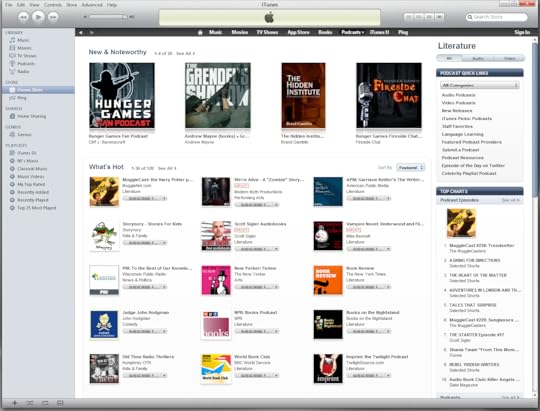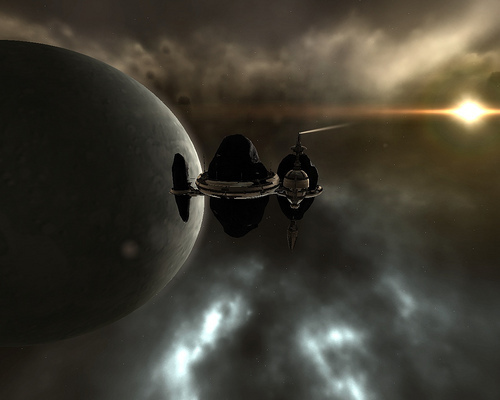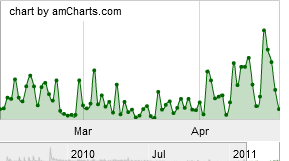Brand Gamblin's Blog, page 10
July 5, 2011
Brand appears on a fashion blog? What madness!
 Gail Carriger, New York Times bestselling author of the "Parasol Protectorate" series posted a picture of us together on her fashion blog!
Gail Carriger, New York Times bestselling author of the "Parasol Protectorate" series posted a picture of us together on her fashion blog!
July 4, 2011
Calls For Cthulhu Episode 9 – The Lost Episode
Originally, Calls For Cthulhu Episode 9 was posted to Far Point Media exclusively, which caused some problems for some people, due to video player issues. Well, the episodes are no longer exclusive, and so I am posting this lost episode to YouTube.
Note: This has nothing to do with the Kickstarter fund, which just reached it's $500 goal. That episode is in full development right now. Look for more info on that this month.
June 7, 2011
Hidden Institute makes iTunes "New and Noteworthy" list!

What does "The Hidden Institute" have in common with the Beatles? We're both featured on iTunes!
In the Literature section of the iTunes Podcasts list, my new book shows up on the first page of the "New and Noteworthy" list.
Today, iTunes. Tomorrow, the world!!
May 28, 2011
Balticon Day 1: Friday
So, we weren't able to travel north to Balticon until after the little one got out of school. After that, we were scrambling to pack, get business cards (BTW, when making business cards, don't try to print out cardstock at the last minute. Pay the extra few bucks to go to Kinkos. Trust me, it's worth saving the hassle).
So then we were on the road. About an hour drive, we reached the Towson Sheraton, and checked in. Because we'd done the Priceline bidding on our hotel, we managed to get rooms at a nice hotel despite being dirt poor. Can't speak to their airfare or car rental, but I was really impressed by how easy it was to get a really great deal on a lovely room.
But enough about that. After we'd swiped our way into the room and tossed all the bags inside, we went running for the Hunt Valley Inn. We headed for the bar, knowing that the location was a point of focus for all the writerly types. Inside, we saw Mur Lafferty, Thomas "Cmdln" Gideon, Steve Eley, and Scott Roche, among others. It was kinda loud and there wasn't anywhere to sit, so we adjourned to the comparably quiet lobby outside. There we met P.C.Haring, A Kovacs, Nathan Lowell, Zach Ricks, Nuchtchas and her husband (who were in the most amazing steampunk fantasy garb). We briefly saw Tee Morris and Phillipa Ballentine, and we chatted a bit with Scott Sigler. We sat and talked with people for hours. It was my idea of the perfect vacation.
One thing that made it especially amazing was that I met a fan. Not one of the, "Oh, you're Brand. I read your stuff. It's pretty good" kind of fans. No, this was an "Oh, my God. I came to Balticon just hoping I'd get to see you. I love Tumbler. No, I mean, it touched me. There have been times in my life where I WAS Libby. I totally related to the story. You are just amazing!" with tears welling up in her eyes.
Now, okay, it may have been the fact that we were out there late at night, and she may have had a couple to drink. It may be that she's totally regretting her effusive kindness. But all I know is that it was the most amazing display of love for my writing that I've ever seen.
I know I'm a newbie to writing, and I know I've got to earn my place for recognition, but that lady just made my night.
May 3, 2011
A Short Sample of my Next Novel

Prologue
"So that gives us," the captain did some quick calculations in his head, "Just under two minutes to live."
Josh nodded, his wide face grim, "That's what I get, sir."
Captain Amory Pershing looked up at the main display. A cutaway view of the ship showed one engine pulsing an angry red. He took a deep breath, then turned to the pilot, "Tandy, I'm going to need some options."
She blinked up at him, "Options?"
"We're not going to make it to Bhont, and I'm not going to let us coast through space for the rest of our lives. If we've got a minute and a half of propulsion, I want it pointing us toward somewhere livable."
"Sir." The pilot nodded and turned back to her station.
The captain turned back to his engineer, "Get the prisoner and bring him up here."
The stocky man blinked up at him, "The stowaway? Uh, look, captain, if we can squeeze a bit more thrust out of that engine by losing some weight, I know how we can get rid of about 80 kilos."
The captain's stare was icy, "Don't think I hadn't considered it. But it wouldn't buy us as much as a second in thrust, and he's more useful to us alive." He turned away and started walking over to the navigation station. Over his shoulder, he said, "Just bring him up here. The bridge is shielded. It's the safest place to be in a crash."
As Josh nodded and left the bridge, Amory put a hand on Tandy's shoulder, "Anything nearby?"
She shrugged a bit, "I've got three solid bodies with a period similar to Earth. There's one that seems habitable, but it's not mapped. Can't tell if there's life there or not."
Captain Pershing stroked his chin, "Lots of seeder ships never reported back. Something could have crashed out here."
"So you don't think it's got life?" An air vent near the captain's station burst off it's hinges and shot a gout of flame into the room, singeing the console. Amory looked at it, wide-eyed. The engine heat was igniting oxygen storage tanks.
He shook his head, "Doesn't matter. If it's got air, land and water, we aim for it. Can we hit it?"
Tandy took a deep breath, "Ah, just barely. We'd be coasting the last million miles or so. After that, it's navigation thrusters only." She squinted at the screen and shook her head a bit, "Yeah, I'd say I could hit it, cap."
"Fine. Get us there." He stepped away from the nav console, looking back at the cutaway of the engine. A thousand different checks were performed every time they set foot on the ship. But there were a million ways the trip could go wrong. Something had the engine sucking in it's own exhaust, causing a brutal feedback loop. He didn't know how to repair it without a lift and a team that could dig into the engine. All he knew was that it would go critical in a little over a minute.
Amory turned to the entrance as he heard feet stomping up the stairs. Josh's baritone voice snarled, "I don't care what you think you're owed. In my book, you're just dead weight."
The captain pointed to the thin man as he entered, head held high, "Mr. Moore. I'm going to need to detain you here for the duration of the trip."
The tall man nodded and let his shackles sizzle as he shrugged his shoulder, "I'm honored, Captain. My previous berth was not quite up to my standard."
Josh came up behind him and shoved the thin man into the room, "Go on, stowaway. You're lucky I don't toss you out the airlock."
The captain pointed to the communications station, "Put him there."
Josh pushed him again, and the thin man sniffed, "The in-flight entertainment has much to be desired as well. So far, it seems to be limited to klaxons and sirens."
Amory walked over to Josh, "How long does it take to shut the engine down?"
Josh shrugged, "If we do it properly, spinning down and everything, about a minute and a half." The ship bucked suddenly, throwing Amory and Josh to the floor. Tandy threw her arms around her station, and the stowaway hung on by his manacles.
Shaking his head as he looked up, Josh said, "All the same, I could just yank the power couplings, and we'd lose thrust in less than a second."
Amory got to his knees and nodded, "Right. You get down to the engine room and wait for my signal."
Josh stood slowly, then turned back to the Captain, "Wait. This is the safest room on the ship, and right before the engine goes critical, you want me standing next to it while you put him -" he jabbed a finger at the stowaway, "up here where it's safe? How is that fair."
The captain glared at him, "I don't trust him to shut the engine down in time. I don't trust him with our lives. In thirty seconds, I don't want him down there deciding he has the power over us."
"Yeah, but -"
"Go!" the Captain roared.
Josh frowned, but then hurried down the corridor. From the navigation station, the stowaway asked, "Is it really that bad, Captain?"
Amory looked at him for a long moment, then checked the time over the main screen. "My count is fifteen seconds. Tandy, we on course?"
"Yes sir. I mean, I'm pretty sure that, with maneuvering thrusters I could get us to -"
"Fine." He stabbed at a button on his console, "Josh, we're on course, and we've got ten seconds. Shut it down."
Josh's voice came crackling through the speaker, "Roger."
The captain took a breath and closed his eyes as the ship shuddered. Either the engine would overheat and explode, or they would be left adrift in deep space. It all came down to their numbers and timing.
A deep, powerful thrum that had been building up over several days suddenly died away. The whole ship seemed to sigh and relax as the forward thrust dropped away. Amory let his breath out in a whoosh. He opened his mouth in a forced yawn, trying to deal with the change in pressure. The lights dimmed, then came up at half-power. Amory turned to Tandy, "Make sure we're on emergency power rations until we can charge the banks back up. Without the engine, it's going to take a lot longer to recharge."
Josh stepped onto the bridge, "So, we're not dead then. There's that."
The captain nodded, "Thank you Mr. Kemuel. Now, if you could dislodge our interloper from the communications station, we need to see if we can get any broadband signal before we fall off the trade route entirely." They both looked at the stowaway who was fearfully gripping the communications station with both arms.
He stared up at them, a haunted look in his eyes, "Okay. Look. Changed my mind. Want to go home."
April 29, 2011
Kickstarter Project for my next book
I just finished launching a Kickstarter campaign to get professional editing for my next book. If you'd like to get a limited-edition, signed version of any of my books, this is the only way to do it. You can also get a Bear Polo shirt, or have your name in the next book! Come check it out!
April 22, 2011
The Best Promotion For Your Book
 Quick post. I just wanted to show you a chart that proves an old adage that we should all remember. This chart shows downloads of "Tumbler" my first novel, over the last couple of months. Notice the spike over April? What could have caused that? I mean, I've been doing a little promoting here and there, but nothing to merit such a consistent rise. So what changed for "Tumbler"?
Quick post. I just wanted to show you a chart that proves an old adage that we should all remember. This chart shows downloads of "Tumbler" my first novel, over the last couple of months. Notice the spike over April? What could have caused that? I mean, I've been doing a little promoting here and there, but nothing to merit such a consistent rise. So what changed for "Tumbler"?
The answer is that, in April, I started seriously promoting my second novel, "The Hidden Institute". Promotion for THI actually bled off to help downloads and sales of "Tumbler". And from what I'm seeing on THI sales, promotion for Tumbler actually helps sell that book too.
Nathan Lowell tells me of a writer who asked his agent, "What's the best way to promote my book?" The agent responded, "Write another book."
Here endeth the lesson.
Oh, and if you'd like to check out those books, you can find "Tumbler" here and "The Hidden Institute" here
April 17, 2011
The Wars
Recently, a reviewer mentioned some problems with my new story "The Hidden Institute". Goodreads won't let me link directly to it, but you can find it here: ( http://www.goodreads.com/review/show/... ). Don't worry, this is not a condemnation or defense against the critique. In fact, I welcome negative comments, as they help me determine what I need to do in future stories.
What I'd like to do here is explain why I allowed one of these issues to remain, even after I recognized it. I would like to explain it as part of how I write.
From the review:
"The major flaw, for me, was that there wasn't enough of it. I wanted to know more -- a lot more -- about the world our hero Cliffy lives in. What is daily life like for the "commoners." Do they work? At what? And what's the deal with the nobility? How did they take power, and what are they doing with it? How did such an obvious gulf open between the social classes? And what exactly are these wars about that get mentioned but never explained?"
When I started writing this story, I put a lot of thought into what the world around Cliffy was like. I sketched little maps, drew aristocratic hierarchical charts on the backs of napkins, I thought about how much money each group should have access to, and how much power. I thought about the place of the clergy, and the military. I built up how the political power was distributed among people, and tried to make it balance out enough to where it would all fit. My main concern was that I built up a world that would work, would be plausible, and was not in danger of revolution.
Then, when all that was done, I threw it away. Well, not really, but I did put it aside so that I could tell the story. I knew that, in the end, this story was about one boy. In some places I had to describe how the world became what it was, but even when I had to do that, I made sure to tell the story in the context of the main character's life.
The worldbuilding is important, of course, and I paid close attention to it. However, if the story is not about the world, that description must take a back seat to the character's story. In a way, the world becomes a character in itself, which reveals it's secrets only as they become needed.
In fact, there are points where I took a certain delight in hiding elements of the world. The "wars", for instance, were deliberately vague. Throughout the entirety of the book, no reference is made to who is fighting, or why. All that is known is that there is a war going on, and that people continue to go about their duties, not even bothering to mention how the war is going.
That was a deliberate addition that I put in as a nod to one of my chief influencers, George Orwell. In his book 1984, Orwell made the argument that a government needs a perpetual war in order to stay in power. He said that, when people get used to sacrificing their own needs to help win the war, the government can hold them forever.
In The Hidden Institute, I created that same mentality. The people go on about their lives, knowing that somewhere soldiers are dying, but not being affected by the knowledge. That kind of mentality should be horrific to us, should stand out as impossible. If we look back to WWII, and we see the kind of involvement every individual played in the war effort, it becomes ridiculous to think that a people could just ignore a war. But Orwell said it could happen, and that governments would do well to make it happen.
And here is where I get myself in trouble. I put that in partially to show people, however subconsciously, that it is happening right now.
At the moment, the United States is involved in five active wars (that I know of). These are places where we have soldiers standing by because of an armistice, or in active duty. South Korea, Iraq, Afghanistan, Somalia, and Lybia. Without making commentary on how right or wrong it is that we should be there at all, the mentality that has grown from this situation is exactly the one that we were warned of.
America is involved in multiple wars, and no one talks about them. People are dying, but it doesn't make the daily news. This is largely because the news of it would be wearying if it were told every day, but the alternative is that people enter this way of thinking where perpetual war is a fact of life.
I was never trying to make this book a call-to-arms, but at the same time, I hoped I could make someone think about the kind of mentality that accepts perpetual war without question. That's why I made it part of my worldbuilding, and that's why it was barely mentioned in the actual story.
April 13, 2011
Worth and Cost
[image error]As a professional writer, I write for money. I work hard on my writing, to make it as good as it can be. However, as a self-publisher, I also work hard on selling my writing. These are two different aspects of the business, the artist and the publisher. The artist wants to say that a story is an ephemeral thing, born of sweat and inspiration, worthy of telling to kings and scholars. The artist feels that each story is special, precious, and worthy of protecting at all costs.
The publisher wants to make money.
At this point, we have a problem because the best way to make money is to treat a story as though it were not a precious little snowflake. The publisher knows that the best way to make money is to treat a story as though it were a widget, a product, and a brand. A story is a creative thing, and as such, it is capable of brand promotion. What that means is, if you read a story of mine, there is a non-zero chance that you'll want to read another story of mine.
The self propegating nature of that is incredibly useful to the publisher, to the point where it can overshadow the value of the first sale. While I may be able to sell a book at $50, I probably won't sell very many, which limits my book's ability to spread its brand promotion. If, however, I give away my book, I maximize the brand promotion, while kneecapping myself on the first sale. So, somewhere in between free and overpriced, the publisher tries to find a way to get the books in as many hands as possible, while still making money.
But already there is a gasp from the artist. "What? Give the book away! But it is art! It is beauty! You cannot disrespect that by saying it is less valuable than a happy meal!" And so we run into the problem. The publisher realizes that there is a balancing point between free and unprofitably expensive. The artist doesn't care. The artist looks at other books and says, "This is how much 'Twilight' costs, and my book is at least as good as that!".
Different people are going to look at it different ways. Some have more of the publisher in them, and less of the artist. As a self-publisher, I have changed my sales price several times, trying to find the best way to improve revenue. In doing so, I have even dropped the price of some books as low as $1 to improve the brand promotion and sales rank.
By comparison, there are some artists who will set the price of their book to $10 on all versions, and never touch it. Without consideration for other factors, they will say, "This is what I think the book is worth" and denegrate those who would say that they aren't interested in buying a new author's work at a steep price.
All of this is personal choice, and we could all happily sell our works in different ways, were it not for one cancerous idea. Some people feel that they have the right to tell others how to price their work, attempting to add value to books by price fixing.
Say there are two writers. One is an artist, the other a publisher. The artist sets his price months before shipping, without doing any research, and proudly declares that his price is based on the book's "worth". The publisher shifts his price constantly, trying successively lower prices, until it starts to cut into his revenue.
At this point, the artist becomes angry, not because his book is affected, but because he feels like the publisher is devaluing all books with his experimentation. The artist becomes nervous, seeing more and more publishers experimenting with prices. "What will happen to me?" The artist worries, "when people assume that you can order a richly-crafted story off the dollar menu?"
Then he turns on the publisher, attacking him for "devaluing" writing, for not respecting the craft, and for dragging down the entire institution. He denegrates the publisher in the Wall Street Journal, in the New York Times, in his own personal network.
In response, all the publisher can do is shrug. He wants to help the artist, wants to respect writing. But he's not willing to give up money for it. The publisher doesn't feel that he should have to pay a tax on the "sanctity of writing". And so he trudges along. They call him cheap, they call him cut-rate, they question the quality of his writing (if it were that good, he would charge more!). And while they hurl insults at him, he quietly cashes his checks and works on his next book.
My guess is that this is not a sustainable model. I think that the publishers, by being more successful, will "breed out" the artists. In five years, there will be no $10 e-books. Artists will either admit that there is no one price for every book, or they will be left in a special cupboard on Amazon reserved for overpriced and undervalued books. They will be proud of their rarity, and in a fit of business sense, might raise their prices because the books are so rare.
---
Brand Gamblin is the author of several novels and short stories. His first novel "Tumbler" can be found at Amazon.com for $2.99. His latest novel "The Hidden Institute" can be found at Amazon for $4.99. Brand likes experimenting.
April 12, 2011
Tumbler now has a book Trailer
If you'd like to explain what Tumbler is about to your friends in a little over a minute, send them this link: http://www.youtube.com/watch?v=hZtgI_LVwoU
So, What do you think of it?



